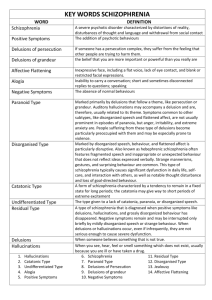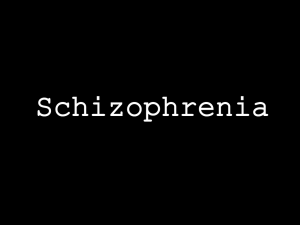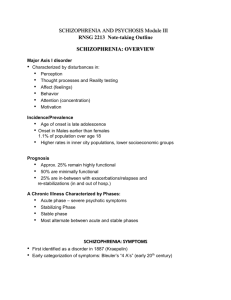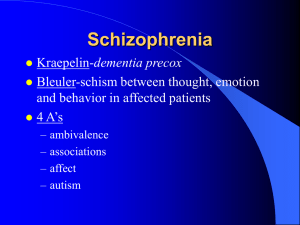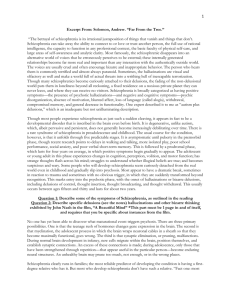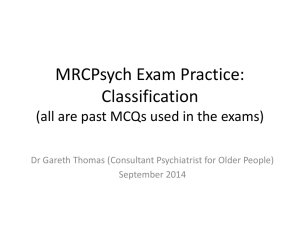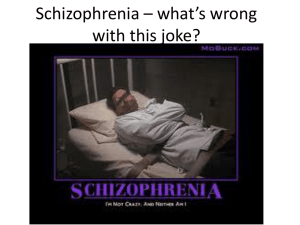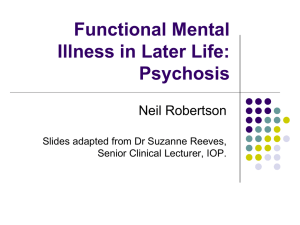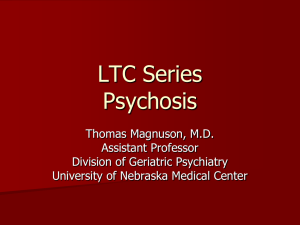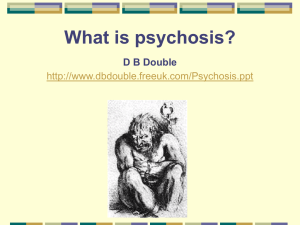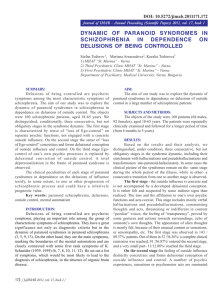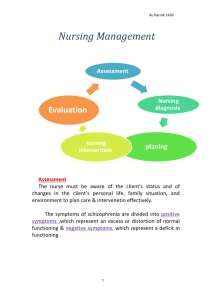Schizophrenia
advertisement
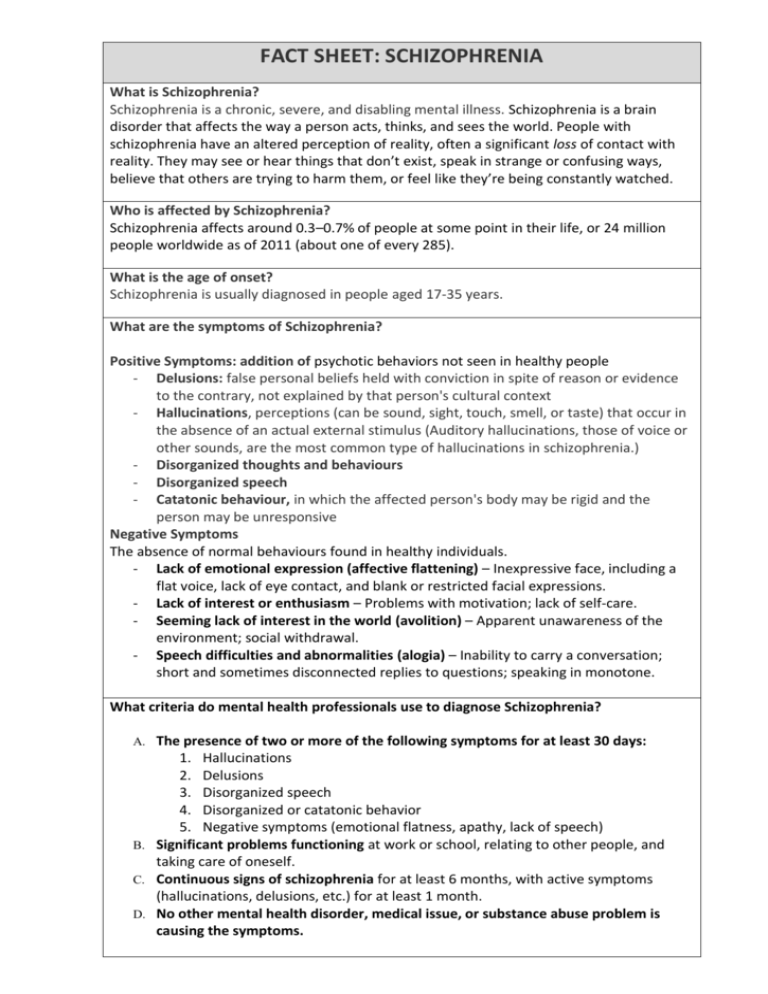
FACT SHEET: SCHIZOPHRENIA What is Schizophrenia? Schizophrenia is a chronic, severe, and disabling mental illness. Schizophrenia is a brain disorder that affects the way a person acts, thinks, and sees the world. People with schizophrenia have an altered perception of reality, often a significant loss of contact with reality. They may see or hear things that don’t exist, speak in strange or confusing ways, believe that others are trying to harm them, or feel like they’re being constantly watched. Who is affected by Schizophrenia? Schizophrenia affects around 0.3–0.7% of people at some point in their life, or 24 million people worldwide as of 2011 (about one of every 285). What is the age of onset? Schizophrenia is usually diagnosed in people aged 17-35 years. What are the symptoms of Schizophrenia? Positive Symptoms: addition of psychotic behaviors not seen in healthy people - Delusions: false personal beliefs held with conviction in spite of reason or evidence to the contrary, not explained by that person's cultural context - Hallucinations, perceptions (can be sound, sight, touch, smell, or taste) that occur in the absence of an actual external stimulus (Auditory hallucinations, those of voice or other sounds, are the most common type of hallucinations in schizophrenia.) - Disorganized thoughts and behaviours - Disorganized speech - Catatonic behaviour, in which the affected person's body may be rigid and the person may be unresponsive Negative Symptoms The absence of normal behaviours found in healthy individuals. - Lack of emotional expression (affective flattening) – Inexpressive face, including a flat voice, lack of eye contact, and blank or restricted facial expressions. - Lack of interest or enthusiasm – Problems with motivation; lack of self-care. - Seeming lack of interest in the world (avolition) – Apparent unawareness of the environment; social withdrawal. - Speech difficulties and abnormalities (alogia) – Inability to carry a conversation; short and sometimes disconnected replies to questions; speaking in monotone. What criteria do mental health professionals use to diagnose Schizophrenia? The presence of two or more of the following symptoms for at least 30 days: 1. Hallucinations 2. Delusions 3. Disorganized speech 4. Disorganized or catatonic behavior 5. Negative symptoms (emotional flatness, apathy, lack of speech) B. Significant problems functioning at work or school, relating to other people, and taking care of oneself. C. Continuous signs of schizophrenia for at least 6 months, with active symptoms (hallucinations, delusions, etc.) for at least 1 month. D. No other mental health disorder, medical issue, or substance abuse problem is causing the symptoms. A. What are the different delusions experienced by a Schizophrenic? Delusions of persecution – Belief that others, often a vague “they,” are out to get him or her. These persecutory delusions often involve bizarre ideas and plots (e.g. “Martians are trying to poison me with radioactive particles delivered through my tap water”). Delusions of reference – A neutral environmental event is believed to have a special and personal meaning. For example, a person with schizophrenia might believe a billboard or a person on TV is sending a message meant specifically for them. Delusions of grandeur – Belief that one is a famous or important figure, such as Jesus Christ or Napolean. Alternately, delusions of grandeur may involve the belief that one has unusual powers that no one else has (e.g. the ability to fly). Delusions of control – Belief that one’s thoughts or actions are being controlled by outside, alien forces. Common delusions of control include thought broadcasting (“My private thoughts are being transmitted to others”), thought insertion (“Someone is planting thoughts in my head”), and thought withdrawal (“The CIA is robbing me of my thoughts”). What are the signs of disorganised speech? - Loose associations – Rapidly shifting from topic to topic, with no connection between one thought and the next. - Neologisms – Made-up words or phrases that only have meaning to the patient. - Perseveration – Repetition of words and statements; saying the same thing over and over. - Clang – Meaningless use of rhyming words (“I said the bread and read the shed and fed Ned at the head"). What are the different types of Schizophrenia? - Paranoid-type schizophrenia is characterized by delusions and auditory hallucinations (hearing voices that don't exist) but relatively normal intellectual functioning and expression of emotions. The delusions can often be about being persecuted by a person or an organization, or feeling harassed or treated unfairly. People with paranoid-type schizophrenia can exhibit anger, aloofness, anxiety, and can be argumentative. - Disorganized-type schizophrenia is characterized by speech and behavior that are disorganized or difficult to understand, and flattening or inappropriate emotions. People with disorganized-type schizophrenia may laugh inappropriately for no apparent reason, make illogical statements, or seem preoccupied with their own thoughts or perceptions. Their disorganized behavior may disrupt normal activities, such as showering, dressing, and preparing meals. - Undifferentiated-type schizophrenia is characterized by some symptoms seen in all of the above types, but not enough of any one of them to define it as another particular type of schizophrenia. - Residual-type schizophrenia is characterized by a past history of at least one episode of schizophrenia, but the person currently has no "positive" symptoms (such as delusions, hallucinations, disorganized speech, or behavior). It may represent a transition between a full-blown episode and complete remission, or it may continue for years without any further psychotic episodes.
